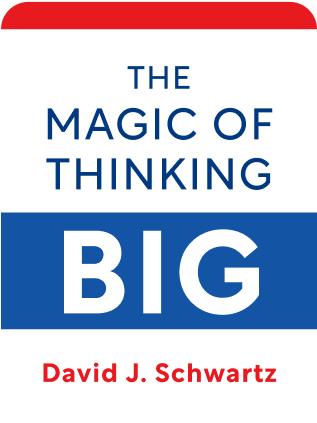

This article is an excerpt from the Shortform book guide to "The Magic of Thinking Big" by David J. Schwartz. Shortform has the world's best summaries and analyses of books you should be reading.
Like this article? Sign up for a free trial here .
What does it mean to “think big”? What sets apart a big thinker from a regular person?
When you learn how to think big, you will become fully aware of your abilities. You will have the self-respect and confidence to know you’re worthy of the job, the relationship, or the promotion. Your possibilities will be endless.
Here are five things that big thinkers do differently.
How to Think Big
You are bigger, more important, more capable and worthier than you think. Where success is concerned, being “big” isn’t measured in inches or degrees or family background. Rather, it’s measured by the size of your thinking. How big do your ambitions get? How confident are you in your abilities?
Unfortunately, many people can’t see themselves as the boss, or in that big house, or in that career. They settle for less and sell themselves short.
What’s wrong with thinking small? When you think small, you miss out on opportunities.
- You see an advertisement for a job and think, “I’d love that! It’s perfect.” But you don’t apply because you automatically think you’re not good enough. Why bother?
- You know a certain sales prospect would be a great fit with your company, but you don’t bother to go for the account. They’re probably too big for you.
- You meet someone you really like, but you don’t follow up or make plans. They’re way out of your league.
When you think too small, you become focused on your inabilities, and you don’t seem to recognize your abilities. (Being aware of your inabilities is healthy, it’s fixating on them that’s problematic.)
The good news is that you can learn how to think big by adopting the “big-thinker attitudes”:
- Don’t think little of yourself. Concentrate on your assets.
- Use positive “big thinking” words.
- See possibilities in every situation and every person, including yourself.
- View your work as important.
- Don’t sweat the small stuff. Focus on what’s really important.
1) Big Thinkers Don’t Think Little of Themselves
It’s easy to fixate on your weaknesses and ignore your strengths. This can be self-limiting, if you feel less capable than you really are.
To accept your full worth and stop selling yourself short, try this fun exercise. It helps you do a reality check and realize just how capable you really are.
- Write down your five best “assets” (education, appearance, skills, attitude, initiative.) Get some objective input from trusted friends, your spouse, and perhaps colleagues. Look for someone who can give an honest opinion.
- Next, under each of your five assets, list three people you know of who have achieved great success, but don’t have this asset to as high a degree as you.
When you’re done, you’ll see that you score better in certain areas than even highly successful people you admire. You have concrete proof that you’re bigger than you think. This is inspiration to fit your thinking to your true size.
2) Big Thinkers Use Positive Words
To become a big thinker, we must develop a “big thinker’s vocabulary.” This isn’t about using big words — it’s using words that paint a picture of positivity and success.
First, it’s important to understand that when you speak or write, you are essentially painting a picture in the minds of others. If someone tells you, “Carol bought a house,” one picture comes to mind. But if they said, “Carol bought a garden cottage,” another picture entirely comes to mind. Words have power to create images.
Big thinkers use words that paint a positive, hopeful picture. A small thinker might say, “I’m sorry to say this project has failed.” But a big thinker would say something like, “We’re going to try a new approach with a great chance of succeeding.” In the first instance, the listeners likely felt defeated and sad. In the second, they would feel more encouraged and ready to try again.
There are four ways to develop a big thinker’s vocabulary.
- When talking about yourself, use positive, bright words.
- For example, if someone asks you how you are, don’t answer, “I’m awful. I have a headache and I’m getting sick.”
- Contrast that with, “I’m wonderful!” Speaking positively about yourself helps you feel wonderful and positive; as a bonus, others react much more favorably to you.
- When talking about others, use cheerful, favorable words. If what you say gets back to that person, be sure it’s something that makes them feel good, such as, “she’s so talented.” Cutting down other people only paints you in a negative light.
- When talking to others, use sincere, complimentary language. Genuinely compliment others’ appearance, achievements, family, and talent. Sincere praise helps others feel good about themselves and about you. Apply this in the workplace and outside of work.
- Use positive words when outlining a plan. When talking about a project, say, “We have a great opportunity,” instead of something like, “We have to do this, whether we like it or not.”
3) Big Thinkers See Possibilities, Not Just What Is
Big thinkers have trained themselves to see the possibilities in a situation, in business, in themselves, and in other people. They see what can be, not just what is. A big thinker visualizes what can be done in the future. They aren’t limited to today’s reality.
“Seeing what can be possible” applies to business opportunities. For example, think of a huge plot of land for sale in the countryside. A small-thinking realtor would market a large plot of land, period. But a big-thinking realtor or developer might see and market this land as a farm, a horse-riding venue, a wedding venue, a luxury rural getaway — the possibilities are endless.
“Seeing what can be possible” applies to how you treat customers. A small thinker sees a customer as one $20 transaction. But a big thinker sees the possibility of a lifetime of repeat business that, with referrals, can grow into thousands of dollars a year in revenue. Big thinkers see the possibilities in every customer and every sales transaction.
“Seeing what can be possible” applies to how you see yourself. Big thinkers see themselves as they can be, not just as they are at present. A small thinker might see herself as a student. A big thinker, however, sees herself as an up-and-coming, breakthrough photographer. When you see the possibilities in yourself, you begin to understand that it isn’t what you have today that’s important, it’s what you’re planning to accomplish.
“Seeing what can be possible” applies to how you see other people. People are an enormous and valuable resource. For example, a small-thinking teacher might look at a kid with poor grades who’s always in trouble as someone not worth her time. But a big-thinking teacher could see a smart child with unique talent who needs nurturing to become a leader, and who might be grateful for life.
To practice seeing the world in terms of possibilities, adopt a “add value” attitude. Think, “what can I do to add value to this situation/to another person/to myself?” This positive thinking gets you to imagine the improvements that are possible.
4) Big Thinkers Take a Big View of Their Work
Many people view their job as dead end. They adopt a philosophy of, “I’m here for the paycheck.” They do just enough to complete their work adequately. This is an example of small thinking.
Big thinkers think their job is always important. They find ways to make a difference, big or small. Big thinkers see themselves as members of a team. They act as if everything in a company or organization affects them. They see the end goals and see themselves as a critical part of the organization reaching those goals.
When you apply this “big view” to your work, you’ll find yourself coming up with new, creative ideas for making things better. This attitude will undoubtedly be noticed and rewarded with praise and more responsibility, and your self-confidence will skyrocket.
5) Big Thinkers Don’t Sweat the Small Stuff
Too often, people with enormous potential let insignificant, petty, small stuff get in their way. When you let this happen, you’re thinking small.
Here are a few examples, with how to shrug off small annoyances:
- Public speaking: A lot of people are nervous about public speaking. The advice they get is about small instructions: “stand straight. Don’t read from your cue cards. Don’t speak too quickly or slowly.” Fixating on all these minutiae is paralyzing and worsens anxiety.
- Instead, think big. Concentrate on what’s important — your message. Have something important to say, and feel a burning desire for others to hear it. Everything else comes naturally. Your listeners will forgive the small issues.
- Arguments: Many arguments start out over small, petty matters that escalate. When you’re done fighting, you can’t even remember why you started.
- Big thinkers stop and ask themselves, “Is this really important? Will this matter in a week?” Usually it’s not important. When you stop an argument from escalating and restore peace, you save time and emotional energy.
- Perceived slights: Sometimes you get the short end of the stick. You get assigned to the small office, or are left off a group text.Small thinkers get offended in these situations. They feel resentment, and then they misbehave, worsening the relationship.
- Big thinkers don’t sweat the small stuff. They let slights go and simply place no importance on trivial matters. Keep thinking big – what really matters for your personal goals? Ignore everything else.

———End of Preview———
Like what you just read? Read the rest of the world's best book summary and analysis of David J. Schwartz's "The Magic of Thinking Big" at Shortform .
Here's what you'll find in our full The Magic of Thinking Big summary :
- The strategies and techniques that successful people use
- How to find victory in every setback
- How to think creatively and come up with innovative solutions






